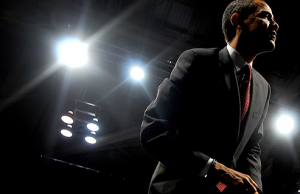There probably is no God. Now stop worrying and enjoy your life.
These words have been emblazoned on hundreds of buses, all at the behest of a young blogger at the Guardian. The campaign, soon joined by Oxford evolutionary biologist Richard Dawkins, placed over 800 of these messages on buses in the UK.
The attention received by the campaign has spawned movements in North America, such as the Canadian Atheist Bus Campaign, which will soon launch similar campaigns in Toronto and Calgary.
While the existence of God is a perennial debate of modern times, the emergence of pop atheism is something else.
Pop atheism is a very public movement designed to needle and confront, to upend cherished beliefs. It’s also a call to arms for all atheists, agnostics, and secular folk to stand up and be counted. To this end, Dawkins is heading a movement called OUT, encouraging atheists to sport t-shirts decorated with a giant, red A on the front.
In the publishing realm, curmudgeons like Dawkins, Daniel Dennett, and Christopher Hitchens have scored runaway hits with their confident declarations that religion is a dangerous delusion. Dawkins purportedly gave £5,500 to the bus campaign himself (a trifle given sales of The God Delusion surpassed 1.5 million). As I reported in an earlier post, atheism and agnosticism have made their mark in recent documentary films like Religulous, The Four Horsemen, and The God Who Wasn’t There.
And while pop atheism has been an interesting movement, it seems destined to die down.
There are several reasons for thinking so:
1) Pop atheism stakes itself to shifting political grounds.
It’s hard to deny that the last 8 years have been changed by religious terrorism and its equally religious response.
For many Americans, the end of the Bush era means the end to one of the worst and most vocally religious administrations in American history. And while former British PM Tony Blair was quieter in his professed beliefs, he admitted to praying over the decision to go with the US to Iraq.
Will a politically motivated atheism have enough political grist for the mill with Barack Obama as the new US president?
IMO, probably not. Obama’s cultivated civic religion is about as inoffensive as possible. In his inauguration speech, Obama even made mention of non-believers to the delight of many atheists.
2) Pop atheism underestimates the role of doubt in faith.
Fyodor Dostoevsky, a fierce Russian Orthodox Christian, had his saintly Prince Myshkin relativize the threat of atheism in The Idiot. “Atheism preaches a negation,” Myshkin says, “but Catholicism goes further: it preaches a distorted Christ…”
Dostoevsky’s nationalism and anti-Catholicism aside, he shows the persistence and passion of religious belief. This may be hard for agnostics and atheists to understand, but bad and corrupt religion historically leads to reform movements, not outright abandonment of belief.
Indeed, Swiss theologian Karl Barth would make his students read the Essence of Christianity by Ludwig Feuerbach (the God Delusion of the 19th century). Barth used Feuerbach’s claim that theism is a projection as a way of refining and deconstructing the thought of his students.
Not surprisingly, The Christian Science Monitor is already claiming religious leaders are hopeful about how Dawkin’s bus campaign could could open dialogue.
3) Pop atheism is just as black and white as any other belief system.
The success of pop atheism lies in its punchiness, its over-the-top rhetorical fluorishes. But rhetoric will only take you so far. The very reason for its success are the reasons why pop atheism is destined for the dustbin.
When scrutinized by philosophers and religious scholars, Dawkins et al fall flat. Notre Dame analytical philosopher Alvin Plantinga sums up the sophistication of Dawkins in his lengthy review of The God Delusion:
You might say that some of his forays into philosophy are at best sophomoric, but that would be unfair to sophomores; the fact is (grade inflation aside), many of his arguments would receive a failing grade in a sophomore philosophy class. This, combined with the arrogant, smarter-than-thou tone of the book, can be annoying.
4) Finally, is it really that hard to be a secular person?



